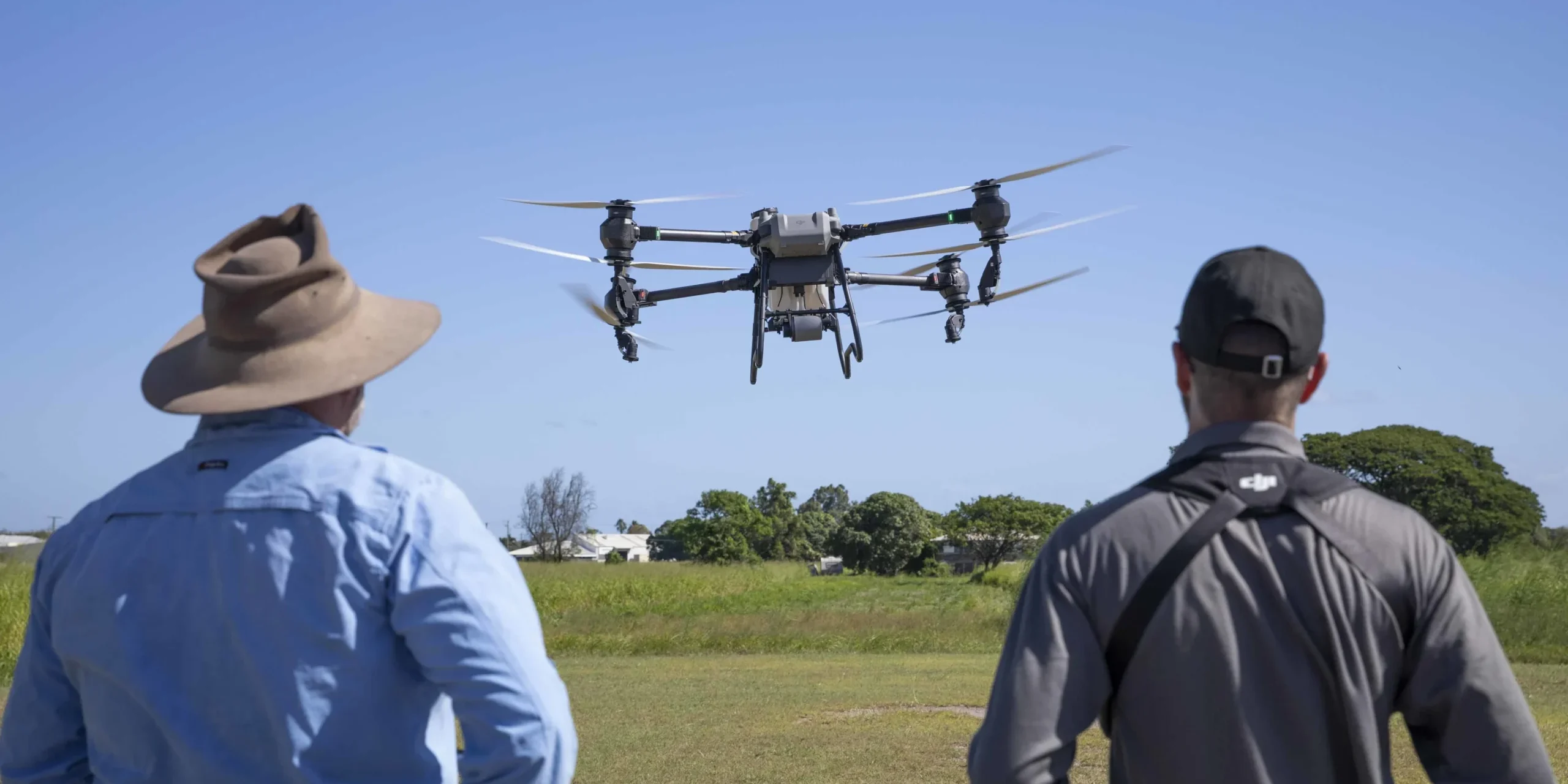Your first step into the spray drone industry starts here!
The agricultural drone industry offers innovative solutions for modern farming. However, entering this field requires understanding and complying with various regulations and best practices. This guide provides essential information to help you start your journey safely and effectively.
NQ Aerovation is here to support you every step of the way!
Licensing Requirements
To operate legally and safely in the agricultural drone industry, obtaining the following licenses is crucial:
Remote Pilot Licence (RePL) <25kg
Issued by CASA, a RePL (Remote Pilot Licence) is mandatory for individuals piloting drones commercially for hire or reward. It ensures that operators have the necessary skills and knowledge to conduct safe operations. If you want to pilot Ag drones commercially, you will need a RePL <25kg, Spray Drone Type Endorsement (for your specific spray drone) and a ReOC (Remote Operators Certificate), or, operate for a business that holds a ReOC. If you are flying a spray drone on your own land and not operating commercially, you still need a Remote Pilot Licence <25kg plus a Type Endorsement for your specific spray drone.
Learn more from CASA: https://www.casa.gov.au/drones/remote-pilot-licence/get-your-remote-pilot-licence
Get your RePL, ReOC and Spray Drone Endorsement: https://www.nqaero.com.au/remote-pilot-licence-repl/
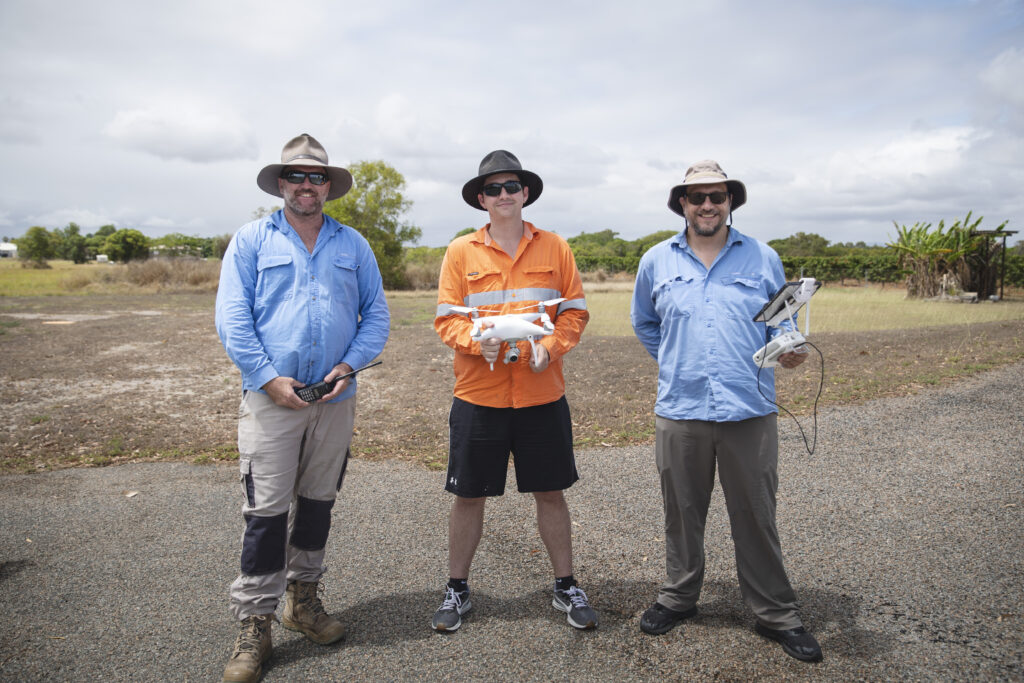
Remote Operators Certificate (ReOC)
Issued by the Civil Aviation Safety Authority (CASA), a ReOC is required for businesses operating drones commercially for hire or reward. A ReOC allows you to apply for permissions and approvals for complex drone operations outside the standard safety rules. If you are planning to operate commercially – you will need a ReOC.
Learn more from CASA: Civil Aviation Safety Authority+1Civil Aviation Safety Authority+1
Get your ReOC: https://www.nqaero.com.au/remote-pilot-licence-repl/
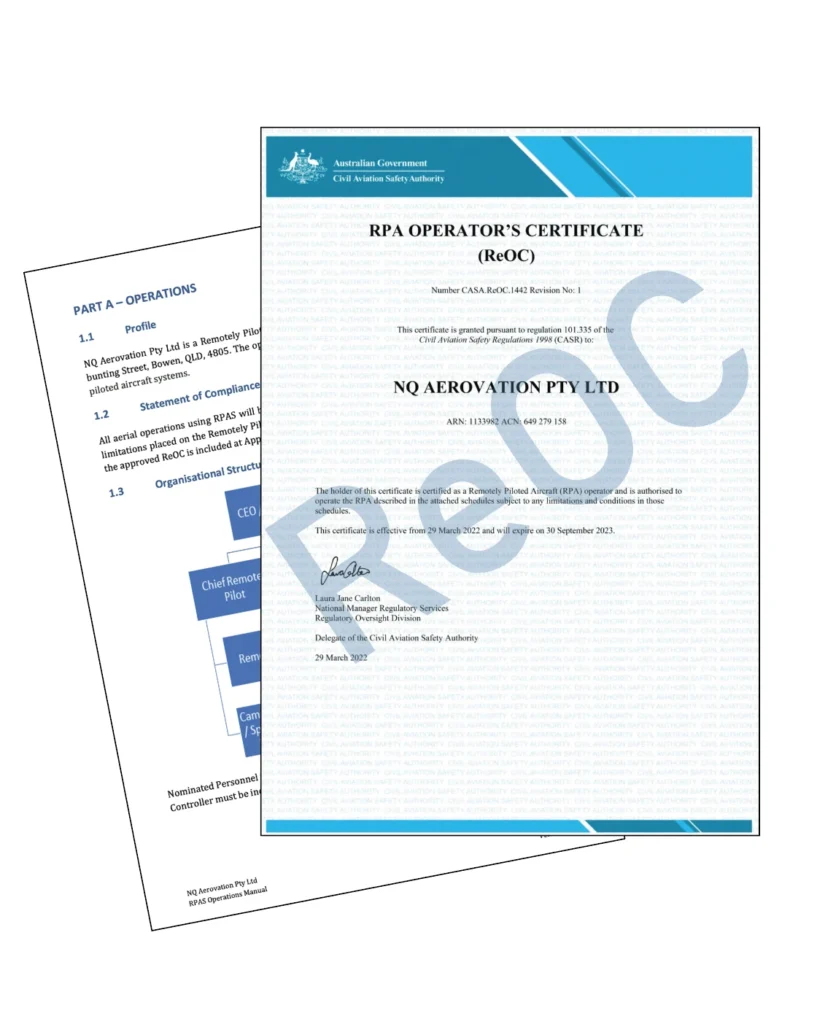
Spray Drone Type Endorsement <150kg
If you are looking to fly a medium class drone (a spray drone with a take off weight of more than 25kg), then you will need to obtain the endorsement on your RePL.
Get your Spray Drone Endorsement: https://www.nqaero.com.au/remote-pilot-licence-repl/
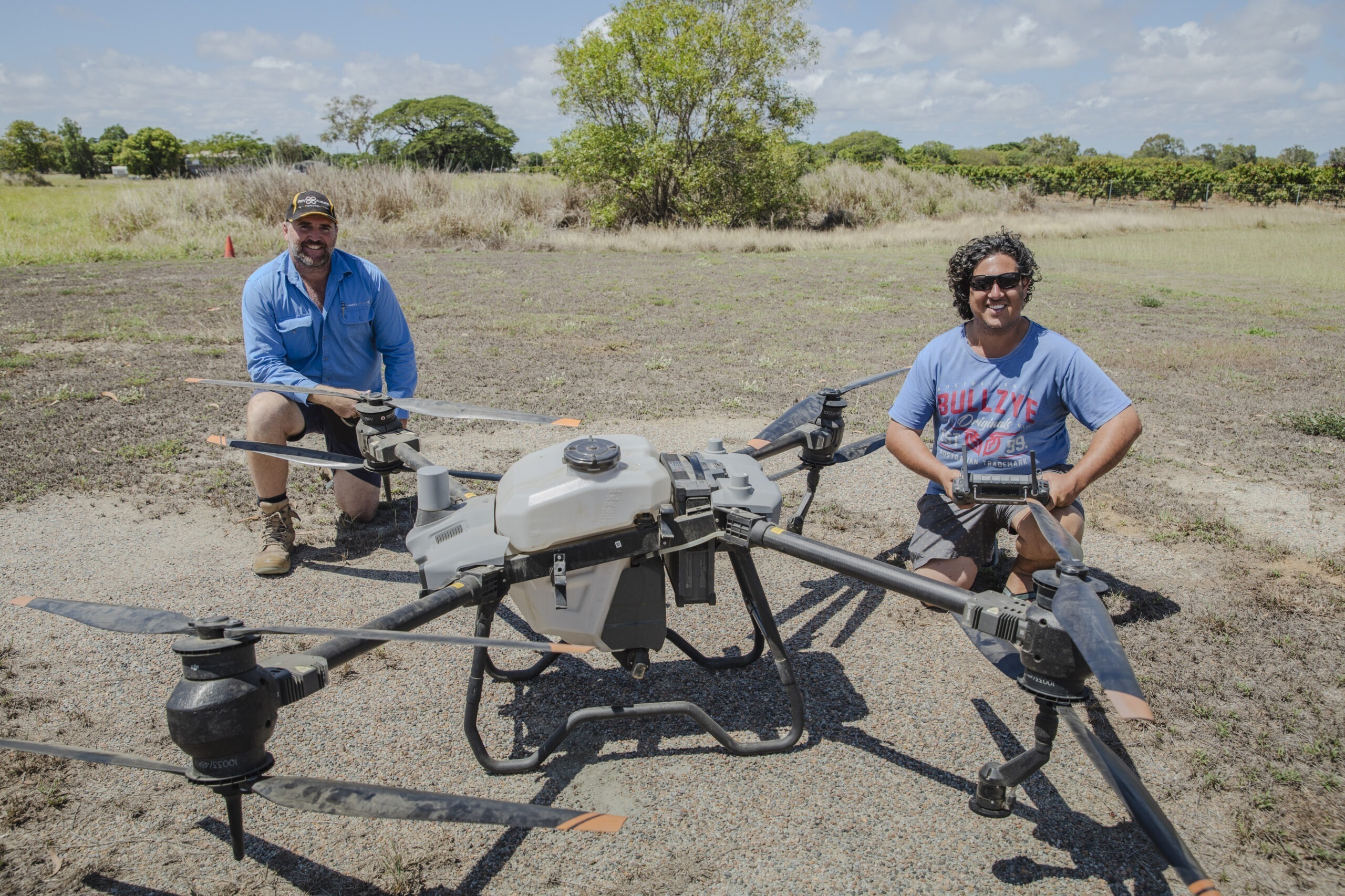
Chemical Accreditation
To apply agricultural chemicals, operators must complete an accredited course covering chemical safety and application techniques: AHCCHM304 Transport and Store Chemicals and AHCCHM307 Prepare and Apply Chemicals to Control Pest, Weeds and Diseases.
Find chemical accreditation courses in QLD: https://www.countryco.com.au
Pilot Chemical Rating Licence
A pilot chemical rating licence allows you to spray, spread or disperse agricultural chemicals, including herbicides, from the air. This is a state-issued license, separate from CASA requirements. If you want to work for yourself, you’ll also need an aerial distribution contractor licence. If you wish to obtain a pilot chemical rating licence, you must be at least 17 years old and hold a Remote Pilots Licence (RePL) and Type Endorsement for your spray drone.
Apply for a pilot chemical rating licence: https://www.business.qld.gov.au/industries/farms-fishing-forestry/agriculture/sustainable/chemical/aerial/pilot
Aerial Distribution Contractor Licence
This licence allows you to work as a contractor and employ people with a pilot chemical rating licence to spray, spread or disperse agricultural chemicals including herbicides.
Required for aerial distribution of chemicals, this license ensures compliance with state-specific regulations and safety standards. In Queensland, you will need an aerial distribution contractors licence to apply agricultural chemicals from the air. This is a state-issued license, separate from CASA requirements.
Any person or organisation that is in the business of aerial distribution of agricultural chemicals, or directs or authorises an aircraft to be used to do so, must hold an aerial distribution contractor licence issued under the Agricultural Chemicals Distribution Control Act 1966.
A licensed aerial distribution contractor may also distribute herbicides from ground equipment, or direct or authorise ground equipment to be used to do so. For an unmanned aerial vehicle (UAV) you need a remotely piloted aircraft operator’s certificate (ReOC) approved for aerial work operations.
Apply for a aerial distribution contractor licence: https://www.business.qld.gov.au/industries/farms-fishing-forestry/agriculture/sustainable/chemical/aerial/licence

Insurance Considerations
Operating drones in agriculture involves inherent risks. Securing appropriate insurance coverage is essential:
- Public Liability Insurance: Protects against third-party claims for property damage or injury.
- Spray Drift Insurance: Covers damages caused by the unintended spread of chemicals to non-target areas.
- Indemnity Insurance: Provides protection against legal claims resulting from professional services or advice.
Get covered in minutes: Drone Care

Decontamination Best Practices
Preventing cross-contamination between different chemicals is vital, especially after spraying herbicides. Thoroughly clean your spray tanks, mixing tanks, lines, and nozzles using a product like Boom Clean. If you are using herbicides such as 2,4-D, check the Boom Clean label to ensure the decontamination chemical is designed to deactivate the chemicals in your tank. This helps remove stubborn agricultural chemicals and prevents residues from affecting future applications. Boom Clean can be purchased from any reputable agriculture supplier.

Record-Keeping and Calibration
Maintaining accurate records is not only a regulatory requirement but also a best practice for efficient operations. Horticulture growers may be required to comply with Freshcare or HARPS food safety standards, making meticulous record-keeping essential.
Additionally, regularly calibrating your drone ensures accurate chemical application, preventing overuse or underuse, which can lead to crop damage or inefficiency.
To assist you in maintaining proper records, download our free record-keeping form.
Download: Record-Keeping Form PDF
Download: Record-Keeping Form Excel Spreadsheet (editable)
This tool helps track chemical applications, weather conditions, and other critical data, ensuring compliance. All agriculture chemical users are responsible under the Chemical Usage (Agricultural and Veterinary) Control Regulation 2017 for ensuring that records of each chemical application are made. Records must be made within 3 days of using a prescribed agricultural ERA product or within 2 days of any other use of an agricultural chemical. Records should be retained by all parties, including the chemical user, licensed distribution contractor (if applicable), and responsible person (if applicable). Records must be retained for a minimum of 2 years, or 6 years for a prescribed agricultural ERA product containing tebuthiuron.
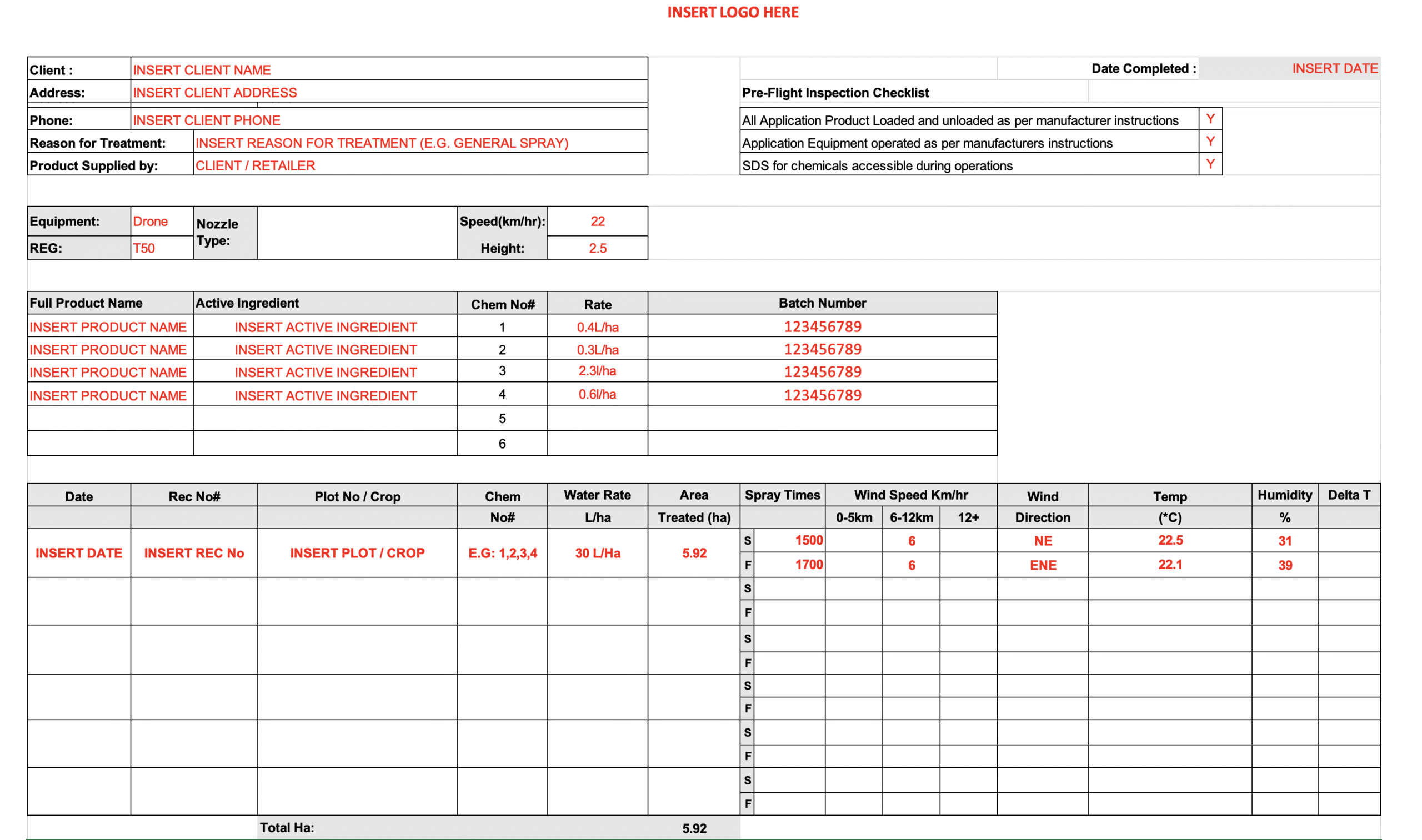

Summary
Entering the agricultural drone industry requires careful planning and adherence to regulations. By obtaining the necessary licenses, securing appropriate insurance, implementing decontamination procedures, and maintaining accurate records, you can ensure safe and successful operations.
NQ Aerovation are here to support you every step of the way. If you have any questions, contact us – start your journey today!
